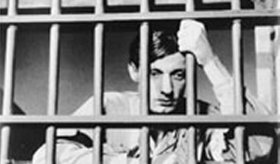
|
| |
| |
|
|
| |
|
|
| |
Man Escaped / Un Homme Echappe
© Unknown - all rights reserved
|
| |
|
|
| |
 |
| Tookey's Rating |
|
|
10 /10
|
| |
| Average Rating |
|
|
9.60 /10
|
| |
| Starring |
| Francois Leterrier, Charles La Clainche, Roland Monod |
| Full Cast > |
|
|
|
| |
Directed by: Robert Bresson 
Written by: Robert Bresson from Andre Devigny's articles
|
|
| |
|
|
| Tookey's Review |
|
| Pro Reviews |
|
| Mixed Reviews |
|
| Anti Reviews |
|
| Cast |
|
| |
 |
| |
| Released: |
1956 |
| |
|
| Genre: |
FOREIGN
THRILLER
BIOPIC
|
| |
|
| Origin: |
France |
| |
|
| Length: |
102 |
|
| |
|
| |
|
|
| |
|
A French resistance fighter (Francois Leterrier, pictured) tries to escape from prison. It takes him two months of hard work.
|
Reviewed by Chris Tookey
|
|
|
| Bresson's film is such a tour-de-force in its use of camera-angles and sound that its main strength can easily be overlooked: it's a masterpiece of story-telling, one of the most gripping movies ever made. It's an antidote to modern American cinema, arousing such terror with the sound of a squeaky bicycle that it has no need for violence or sensationalism. It's also an antidote to the literary traditions of British moviemaking: there's no philosophising here about freedom, resilience and the human spirit. There's no need: they pervade every frame. |
| It is a welcome reminder that it is possible to be cinematic within a very small physical area. Bresson's hero constantly looks out of his cell window, yet we never see the panorama which he does: a flagrant violation of cinematic convention, where such a shot is traditionally followed by a cut to wherever the person is looking. No less daringly, Bresson operates without recourse to that mechanism which film students learn is indispensable to story-telling: the "establishing shot". In ignoring this convention, he not only creates a sense of claustrophobia: he also concentrates our attention on essentials. |
| The characters are treated with equal ruthlessness. We hardly see the face of a German guard: when we do, it is either out of focus in long shot, or fleetingly a fragment of face. The oppressors are effectively and poetically dehumanised by the director, without their having to resort to sadistic or melodramatic acts. Every episode of violence occurs offscreen, and yet it's more shocking than the most explicitly photographed carnage. |
| Although the acting in the film is entirely by non-professionals, A Man Escaped is so well acted that it makes other escape movies seem mannered. The prisoners seem to share an almost tangible fatigue - which Bresson actually achieved by browbeating his cast with endless repetition and retakes of each scene. Never mind: the end justified the moans. |
|
| MIXED |
|
| "Bresson's camera hovers about the central character, never seeing more the visual world than is necessary ... Since the audience sees even less than the hero, its sense of hearing is intensified by recurring off-screen noises .. Bresson's emphasis on off-screen sounds and the limited range of his camera represents a new approach to the problems of subjective cinema in the age of the talking film... This path to intense drama has it hazards... it is almost impossible to generate any emotional power within the limits of Bresson's technique .. Part of the reason that [the film] does not rise to the exultant pitch of Mozart's Mass in C Minor [on the soundtrack] is that Jost, the priest, and the old man all seem more recognizable than [the hero.]" |
| (Andrew Sarris, Film Culture) |
|
|
|
|
|
|
|
